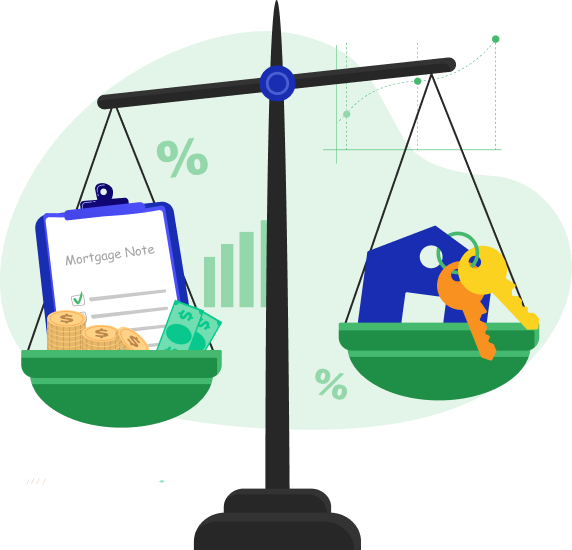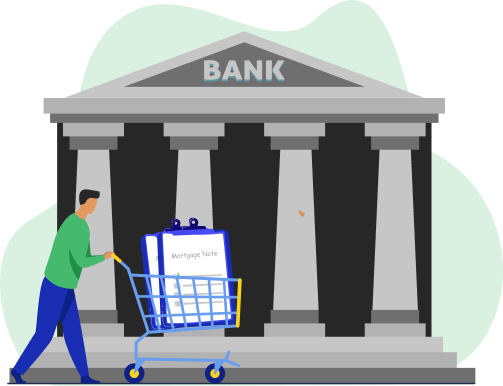Mortgage notes add value to an investment portfolio by providing a source of recurring passive income while offering multiple diversification options. Mortgage note investors can choose from a range of safe to high-risk investments with variable rates of return.
Mortgage Notes in Your Investment Portfolio
Mortgage note investing provides a means to generate recurring passive income. Mortgage note holders own an interest in real estate without the responsibilities of property management or rehabilitation. This form of investing has the potential to generate high yields with relatively low risk.
On this page, we will cover these topics:
How do real estate notes add value to my investment portfolio?
One of the most important benefits of private mortgage note investing is the positive cash flow created as a result of the borrower making monthly payments on the loan. As the noteholder, you become the bank.

Mortgage Notes Vs. Other Real Estate Investments
Most real estate investments carry responsibilities such as property management or rehabilitation work.
Property flips often result in negative cash flow while properties undergo repair. If the market tumbles, you encounter unexpected repairs, or the property takes longer than expected to sell, you could lose your investment.
Rental property income can be unreliable due to changing occupancy rates, turnover costs, and maintenance costs.
When you purchase a mortgage note, you are only responsible for servicing the loan. The homeowner is responsible for property maintenance. Your monthly cash flow can remain unchanged without regard to the maintenance needs of the property, tenants moving out, or downturns in the market.
As a result, mortgage notes are as close to being passive income as any real estate investment can be.
Mortgage Note Failsafes
Mortgage notes offer multiple methods of recouping your initial investment and increasing returns, even when something goes wrong. If the borrower defaults, you have the following options:
- Offer a loan modification
- Foreclose on the property
- Sell the note at a discount as a distressed note
If you foreclose on the property and the market rent in the area is higher than the mortgage, you may be able to profit from renting out the property.
Interest rates and property values fluctuate, but mortgage notes are much less sensitive to these changes when compared to other real estate.


Types of Mortgage Notes
Mortgage notes can secure a variety of property types, including single-family dwellings, multi-family properties, vacant land, and commercial properties. Regardless of the type of collateral used, mortgage notes can be divided into two categories, according to U.S. News: performing and non-performing.
Performing
A performing mortgage note is a mortgage note in which the borrower is making on-time monthly payments. This type of note is considered lower risk, and the risk is reduced as the note gets older. This is known as seasoning. These notes are typically sold for an amount near the loan amount and higher in some cases.
Non-Performing
Also known as distressed notes, a mortgage note is considered non-performing when the borrower is at least 90 days in arrears. These mortgage notes are typically sold at a deep discount because they come with higher risks. However, they also have the potential of yielding high returns.
What kind of yields should I expect from mortgage notes?
According to Investopedia, most real estate investors compare the yield to the average annual yield in the S&P 500. In recent years, that has been approximately 10 percent. If the return is expected to be below that amount, many real estate investors walk away.
However, a return that is unacceptable to one investor may be acceptable to another, especially if those returns are from a large number of safe investments.
Factors that Impact Yield
The following factors result in a higher yield:
- Owning the note longer
- Higher interest on the note
- A discounted purchase price
All of these factors also come with a higher risk. As long as you own the note, you continue to face exposure to the risk of the homeowner defaulting on the loan. If the note has a higher interest rate or if you were able to purchase the note at a discounted price, it usually points to the existence of risk factors, such as the following:
- A non-performing note
- A low borrower credit score
- A loan that has been modified
- A loan that is not well-seasoned
Furthermore, if the seller pays off the loan early, your return may be reduced. While this frees up funds, it reduces your return.
The flip side to these risks is that if you purchase a non-performing note at a discount and successfully modify the loan, you may be able to charge a higher interest rate and enjoy a higher ROI with a long-term holding strategy or you may be able to flip it for a high rate of return after a short seasoning period.
What are the potential risks associated with note buying?
The most significant risk for most mortgage notes is the risk of default. This is tempered by the fact that you can foreclose on the property, but this does not make private mortgage note investing risk-free. Even with a foreclosure, the following could still go wrong:
- Tax liens
- Poor property condition
- Property depreciation
- Holding costs/inability to sell
Tax liens are particularly damaging because they take priority over mortgage liens, creating the possibility that a mortgage note holder could suffer a complete loss if the tax debt is high enough.


How can I mitigate the risks?
While risks cannot be eliminated, they can be minimized. The most important way to minimize your risks is to complete your due diligence, paying special attention to specific characteristics regarding the borrower, the note, and the property.
Borrower Characteristics
The lowest-risk borrowers are those with a strong credit history who live in the property or use the property for business and have an established history of making mortgage payments on time.
Borrower Characteristics
Notes that have aged for a few years are a lower risk than new notes. This is known as seasoning. The longer a borrower has made on-time payments, the more likely those payments are to continue.
If the loan has been modified due to the borrower’s financial difficulties, this could indicate a one-time circumstance beyond the borrower’s control that likely will not recur, or it could be the beginning of a pattern of non-payment.
One method investors use to reduce the risk is to spread the risk between multiple notes by purchasing notes in batches. These are known as mortgage-backed securities.
Property Characteristics
Familiarity with the real estate market and how property valuation works is an important aspect of reducing risks when purchasing mortgage notes. Important factors to understand about the property include the following:
- The borrower’s equity in the property
- How the mortgage payment compared to the market rent in the area
- The value of the property at the time the borrower purchased it compared to now
- The overall conditions of the real estate market in the immediate vicinity of the subject property
Borrowers are less likely to default when they have higher equity in the property. In addition, if the market rent in the surrounding area is significantly higher than the mortgage payment, the borrower has an extra incentive to avoid default.
Where to Buy Mortgage Notes
The most abundant source of mortgage notes is banks and other lending institutions. According to Forbes, banks often see mortgage notes as risky investments and sell them at a discount, even if the note is performing well.
However, purchasing notes from banks can be challenging for individuals. You can also purchase notes from the following sources:
- Private noteholders
- Online note exchanges
- Note brokers
You may be able to find private noteholders through your local real estate investors association.


Your Exit Strategy
When purchasing any investment, you should always have an exit strategy. While your original purpose in purchasing mortgage notes is passive income, there may come a time when you need access to your funds quickly. Deed Street Capital purchases mortgage notes from investors who need to cash out quickly.
Whether you are facing an emergency or need the funds to reinvest, contact us today to learn how quickly you can access your investment capital.